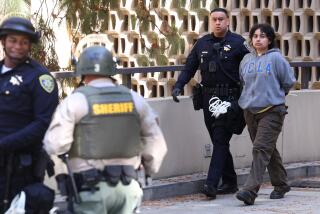Agriculture critic reaps alumni anger
When officials at Cal Poly San Luis Obispo scheduled a free lecture by bestselling author Michael Pollan, they envisioned a lively talk about sustainable food, along with Pollan’s customary critiques of agribusiness.
What they didn’t expect was a wave of denunciations from angry farming and ranching alumni who rank Pollan as a force only slightly less damaging to agriculture than the Mediterranean fruit fly.
Threatening to pull his donations, the head of one of California’s biggest ranching operations succeeded in turning today’s planned lecture into a panel discussion involving Pollan, a meat-science expert, and a major grower of organic lettuce.
Pollan assented but said in an interview that the incident raised troubling questions about academic freedom.
“It’s an open threat to the university,” he said. “The issue is really about whether the school is free to explore diverse ideas about farms and farming.”
Pollan was the star attraction at a fundraising dinner for Cal Poly’s sustainability programs Wednesday night.
For David E. Wood, chairman of Harris Ranch Beef Co., Pollan’s solo lecture would have provided the author of such books as “The Omnivore’s Dilemma” a soapbox for “anti- agricultural views.”
“While I understand the need to expose students to alternative views, I find it unacceptable that the university would provide Michael Pollan an unchallenged forum to promote his stand against conventional agricultural practices,” Wood wrote in a Sept. 23 letter to Cal Poly President Warren Baker.
Wood has pledged $150,000 toward a new meat processing plant for the campus cattle herd. In his letter, he said Pollan’s scheduled appearance had prompted him to “rethink my continued financial support of the university.” He also criticized an animal-sciences professor who said that conventional feedlots like the one run by Harris Ranch were not a form of sustainable agriculture.
Harris produces and markets 150 million pounds of beef a year. As many as 250,000 head of cattle annually are fed on a grain diet at the company’s sprawling feedlot beside Interstate 5 in the San Joaquin Valley. In a 2008 interview with The Progressive magazine, Pollan said the sight of the “manure-encrusted” acreage was one of the things that permanently changed the way he ate.
Cal Poly officials said they had contemplated using Pollan’s talk as the basis for a panel discussion at some point -- but the negative reaction to the planned lecture from Harris officials and others propelled the plan onto the front burner.
“When we realized how significant a backlash was coming, we thought of having the panel right after his speech,” said David Wehner, dean of Cal Poly’s College of Agriculture, Food and Environmental Sciences.
“I’m frustrated and saddened by some people’s attitudes,” he said. “They’ve looked at this as us supporting his views and not supporting them. We don’t have a political position -- we only educate students.”
In an interview, Pollan said he rejected the idea of participating in a panel immediately after his talk.
“I thought, ‘Wow! You’re going to add some whole other event at the behest of some cranky donors?’ ”
He said he offered the university a choice of either his lecture or his appearance on a panel. The other panelists are Gary Smith, a meat-science researcher at Colorado State University, and Myra Goodman, co-founder of Earthbound Farm, a company that grows organic vegetables on 33,000 acres.
Pollan, who teaches journalism at UC Berkeley, has faced negative reactions to his college appearances from farm- related businesses elsewhere.
At the University of Wisconsin, where his book was part of a campus-wide reading project, a state farm bureau official called him “narrow and elitist,” saying that he “sees an evil empire behind every item in your refrigerator.” At Washington State University, an alumnus dug into his own pocket to pay for Pollan’s appearance after a similar reading was canceled.
“It’s part of what appears to be a more aggressive industry push-back against critics of industrial agriculture,” Pollan said.
Some in the industry fear that Cal Poly’s highly regarded agriculture school is veering away from its mission of teaching accepted farming practices. Critics cited the school trimming its herd of dairy cows from about 150 to 30 -- an economic necessity, according to school officials.
“I’m worried about Cal Poly’s direction,” said Barbara Martin, who writes a blog called Dairy Goddess from the 800-cow Lemoore ranch she runs with her husband, Tony. “Do I think they’re out to turn vegan? No -- but there’ll be fewer opportunities for hands-on learning.”
Martin, whose son is a Cal Poly dairy science student, said the panel format for Pollan’s appearance is a perfect compromise: “As a parent and a taxpayer, I’m satisfied that students will be exposed to all sides of farming practices and agricultural decisions.”
For Pollan, though, questions remain.
“Is the principle of balance going to apply across the board? The next time Monsanto comes to speak at Cal Poly about why we need GMOs (genetically modified organisms) to feed the world, will there be a similar effort? Will I be invited back for that show?”
Wehner, the Cal Poly dean, said, “The answer, essentially, is yes.”
When voters in San Luis Obispo County were considering a measure banning genetically modified foods, he said, the school sponsored a panel with advocates on both sides.
--
More to Read
Sign up for Essential California
The most important California stories and recommendations in your inbox every morning.
You may occasionally receive promotional content from the Los Angeles Times.











